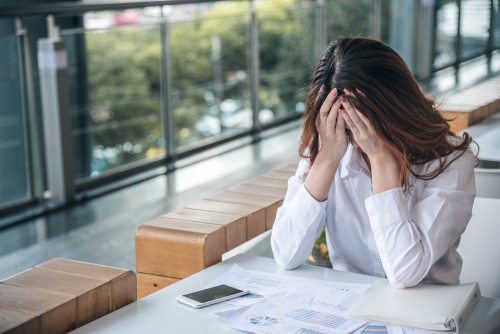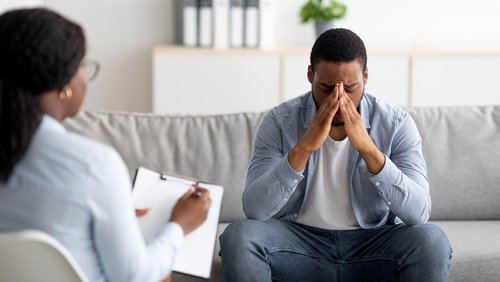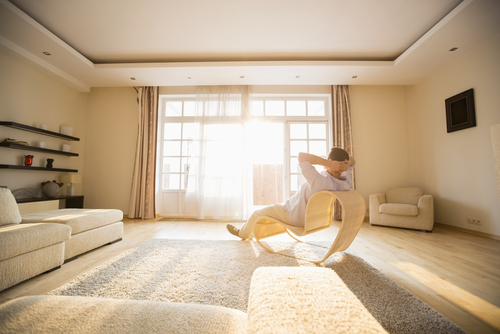Free-floating anxiety can feel like a constant, nagging worry that pops up out of nowhere. You’re on edge for no real reason, and little things seem to set you off. This type of anxiety may come and go throughout the day or stick around for hours, making it hard to focus or relax.
People with free-floating anxiety have a heightened sense of tension and distress that keeps them in a perpetual state of worry. Their mind and body are in a trigger-ready mode where the smallest thing can spark feelings of nervousness or fear.
While overcoming free-floating anxiety may take time and effort, learning skills to better manage worries and stress can significantly improve your day-to-day life.

What Causes Free-Floating Anxiety?
Free-floating anxiety can strike without warning or obvious cause. If you frequently experience anxiety that seems to come out of nowhere, several factors could be at play:
- Genetics: Anxiety disorders often run in families, so you may be genetically predisposed. Having a close relative with an anxiety disorder puts you at higher risk.
- Traumatic experiences: Going through a traumatic or distressing event can make you more susceptible to free-floating anxiety. The memory of that experience may continue to trigger feelings of anxiety even long after the event.
- Brain chemistry: Certain neurotransmitters in your brain, like serotonin, help regulate mood and anxiety. If these chemicals are out of balance, it can lead to the development of an anxiety disorder. The amygdala, the part of your brain responsible for the fear response, may also be overly activated.
- Upbringing: Being raised in an environment where anxiety and worry were common or encouraged can make you prone to experiencing free-floating anxiety as an adult. Anxious behaviors and thought patterns learned during childhood are often hard to unlearn.
The good news is that free-floating anxiety can be managed through treatment like therapy, medication, mindfulness, and lifestyle changes. Understanding the underlying causes is the first step towards controlling anxiety and living a calmer, happier life.
Read more: Emotional Wreck: Signs, Causes, & What You Can Do
Signs and Symptoms of Free Floating Anxiety
When anxiety feels like floating freely with no clear source, the signs and symptoms can vary and intensify. You may experience:
- Anxiety
- Diarrhea
- Difficulty concentrating
- Discomfort
- Fainting
- Fatigue
- Headaches
- Insomnia
- Irritability
- Muscle Tension
- Nausea
- Negative self-talk
- Shortness of breath
- Stomach aches
- Sweating
The intensity of these signs and symptoms can wax and wane, but the underlying anxiety and discomfort often persist. Free-floating anxiety can make daily life stressful and tiring as your mind and body remain on high alert.

Treatment Options for Free Floating Anxiety
Treatment options for free-floating anxiety typically involve therapy, medication, or a combination.
Cognitive Behavioral Therapy
CBT is one of the most effective treatments for free-floating anxiety. It helps identify negative thought patterns and replace them with more constructive ones. Some CBT techniques for free-floating anxiety include:
- Identifying negative thought patterns like catastrophizing or all-or-nothing thinking and challenging them with more balanced thoughts.
- Behavioral techniques like exposure therapy, where you gradually expose yourself to the situations that cause anxiety in a controlled setting. This helps desensitize the anxiety response.
- Relaxation and mindfulness techniques like deep breathing, meditation, and yoga. These help lower anxiety and increase awareness and calmness.
- Homework assignments to practice CBT techniques in your daily life. Repeating them helps make the lessons stick.
CBT is often provided through weekly therapy sessions over 12-16 weeks. It gives you tools to manage anxiety in the long run better. Medications like anti-depressants or anti-anxiety medications are sometimes combined with CBT to help alleviate severe symptoms so you can fully benefit from therapy.
Medication
Anti-anxiety medications like benzodiazepines can help alleviate anxiety symptoms. Anti-depressants are also commonly prescribed for anxiety disorders. Short-term medication may be used to relieve severe symptoms.
Therapy
- Solution-Focused Brief Therapy (SFBT) focuses on building strengths and finding solutions. This type of therapy aims to help you gain awareness of your anxiety triggers and coping strategies.
- Narrative Therapy examines the stories you tell yourself that can influence anxiety and helps you develop new narratives to decrease anxious thoughts.
- Mindfulness-Based Stress Reduction (MBSR) teaches mindfulness practices like meditation, yoga, and breathing exercises to increase awareness and relaxation.
- Music Therapy uses music to help improve your mood and decrease anxiety. Listening to calming music can shift your mind from anxious thoughts and induce a relaxed state.
Anxiety treatment often involves a combination of therapy and medication tailored to your needs. Speaking with a mental health professional about your best options is an important first step towards wellness.
How To Cope With Free Floating Anxiety
When feelings of anxiety seem to come out of nowhere, it can be hard to cope. Here are some strategies to help ease free-floating anxiety:
- Limit caffeine and stay hydrated: Caffeine can exacerbate anxiety and stress. Reduce intake or switch to decaf options. Staying properly hydrated also helps your body and mind function better.
- Exercise: Go for a walk or jog, do some yoga, or get outside for fresh air and light activity. Exercise releases feel-good hormones that can help calm anxiety and clear your mind.
- Practice deep breathing: Take some deep, slow breaths from your diaphragm to help lower your heart rate and blood pressure, activating your body’s relaxation response. Breathe in through your nose and out through your mouth.
- Meditate: Spending just a few minutes a day focused on your breath can help reduce worrying thoughts and increase mindfulness and inner calm. There are many free guided meditations for anxiety available online.
- Challenge anxious thoughts: Notice negative or unrealistic thoughts and try to reframe them in a more positive, realistic way. Ask yourself questions to gain a more balanced perspective. Your thoughts have power over your anxiety levels.
- Check your negative self-talk: Notice the thoughts that increase your anxiety and replace them with more positive and realistic ones. You have the power to influence your mindset.
- Accept the emotions you’re feeling instead of fighting them: Anxiety is a normal human emotion; the more you resist it, the more power you give it. Take a few deep breaths and remind yourself that the feeling will pass.

How Mental Health Housing Provides Stability
Living with anxiety and mental health issues can feel like constantly treading water in a vast, churning sea. Mental health housing provides a life raft – a stable base of support to climb into when the waters get rough.
Staying in mental health housing allows you to establish a routine and stick to a regular schedule. Waking up and going to bed at the same time, eating meals at regular hours, and keeping to a routine can help reduce anxiety and make each day feel more predictable. The stability of a routine establishes normalcy and control over your situation.
Living in a supportive housing environment also means having staff available 24/7 in case of emergencies. Knowing help is there if you need it can help alleviate worry and panic. The staff are also trained to provide counseling and help connect you with additional mental health resources. They understand what you’re experiencing and can offer empathy and advice.
In mental health housing, you’re surrounded by others dealing with similar issues. This can help combat feelings of isolation and provide solidarity. Connecting with others on a shared experience creates community and support. You have people around you who truly understand what living with anxiety and other disorders feels like.
Read more: What Is A Halfway House For Mental Health Called?
Contact Riviera Recovery
If you frequently feel uneasy and worried for no apparent reason, talking to a mental health professional is a good idea. They can determine if your symptoms match the criteria for generalized anxiety disorder or another anxiety condition. The sooner you get help, the sooner you can find relief.
Generalized anxiety disorder often worsens over time without treatment. Excessive anxiety and worry may eventually lead to avoidance of situations or events due to irrational fears and concerns. This avoidance can disrupt your life, relationships, work or school obligations, and daily activities.
The good news is generalized anxiety disorder is very treatable. A combination of therapy, medication, lifestyle changes, and self-help strategies can help get your anxiety back to a manageable level so you can live freely again. Don’t hesitate to call Riviera Recovery Today at (855) 207-9708. We are here for you.


